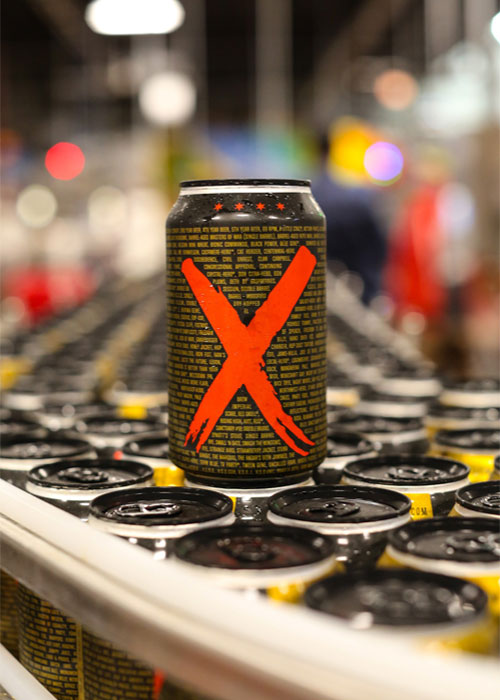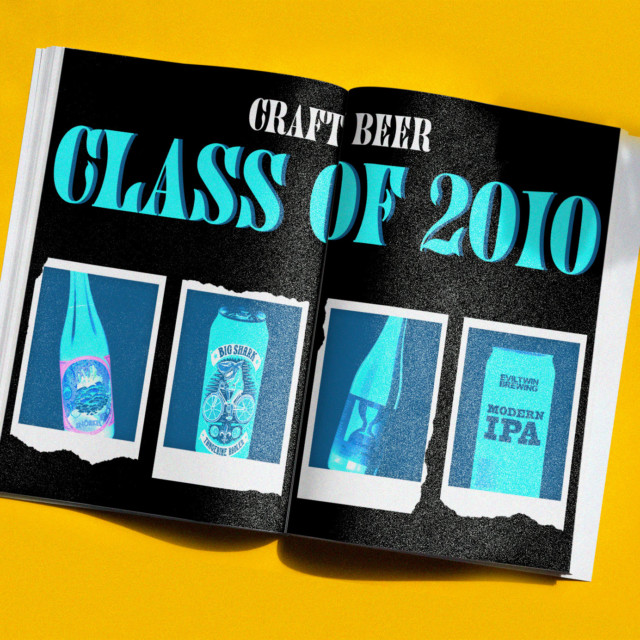With infections dropping and vaccinations rising, at least in the U.S., mid-2021 looks like a point to reflect upon what went missing over the last year and a half, from the countless lives lost and millions fallen ill, to the shuttered businesses, wasted opportunities, and missed time with family and loved ones. In the world of craft beer, that list includes a year of major anniversaries that largely went unnoticed. While the dates were overshadowed by the growing pandemic from March onward, 2020 should have been a year of celebration for the class of 2010, a nonpareil group of breweries that all opened 10 years earlier.
The significance of the craft beer class of 2010 is hard to overstate. While every year sees the appearance of breweries that later become famous, 2010 featured some of the most influential brands of the recent era, including Jester King, Hill Farmstead, Urban Chestnut, Evil Twin, Crooked Stave, Breakside, and more.
A Remarkable Cadre
What made 2010 such a big year for craft beer? Possibly the emerging importance of local foodways at the time, according to Jester King Brewery co-founder Jeffrey Stuffings.
“I think it kind of dovetails with the movement towards local production of food and drinks, supporting local agriculture, this national consciousness that food doesn’t come from a factory or just a giant industrial farm,” Stuffings says. “That food can be produced locally, sustainably, with quality, and that by supporting something like that, you’re actually doing yourself a favor by opening your eyes to really all these interesting flavors and aromas that are unique to [a] place.”
Another key element in 2010: previous pathfinders. Unlike microbreweries and the proto-craft breweries back in the ’80s, ‘90s, and aughts, new breweries opening in 2010 were able to build upon the work of a relatively large group of successful earlier independents, some of whom already had established networks for sales and distribution.
The 2010 brewery Mother Earth Brew Co. — named one of VinePair’s best breweries in America in 2019 — got a big hand from earlier producers in California, according to co-founder Kamron Khannakhjavani.
“We had the support of other breweries referring customers to us — folks like Stone, Green Flash, and Pizza Port were all pretty integral in our initial success,” Khannakhjavani says. “Phase Two was when we began getting shelf placements in retailers and grew a significant distribution footprint with Stone Distributing. That was the point I would say we ‘made it,’ as the kids say.”
Quality Beer, Qualified People
Unlike earlier craft brands, the breweries that launched in 2010 were also able to connect with a large group of people who already knew what craft beer was — and not just consumers.
At Urban Chestnut Brewing Company, brewmaster Florian Kuplent credits part of his brewery’s success to making lager beers in the lager-loving town of St. Louis, as well as Urban Chestnut’s ability to find great employees.
“I would hope it was the good beer that we make that made us successful,” Kuplent says. “We’ve been able to hire some very dedicated and well-qualified people that really have helped to put Urban Chestnut out there and make sure that we produce consistently good beers and consistently do a good job at selling them on a daily basis. That’s been a huge part of our success as well.”

Lost Parties
With breweries from 2010 scattered throughout the country, there’s hardly a corner of America that didn’t miss out on a significant party in 2020. Jester King had hoped to work on a series of events and make an “anniversary tour” of collaboration brews and tastings, Stuffings says, but the pandemic arrived before he was able to make any concrete plans. Hill Farmstead was able to get one early event in under the wire at its site in Vermont, though larger festivals later in the year were canceled. Other 2010 breweries were deep in preparations when lockdown arrived.
Mother Earth was in the middle of planning a massive, reggae-themed beer festival called A Decade of Love, Khannakhjavani says. The brewery had already cleared all of its permits, received sign-offs from local law enforcement, and made substantial investments in promoting the party when it became clear that it couldn’t go forward.
“We were slated to have 20 breweries, live bands, food trucks, and even a warehouse after-party with a DJ,” Khannakhjavani says. “We were only 30 days out from the day of the event when we had to cancel everything.”
With lockdowns happening at different points in different states and regions, some breweries were able to hold an event, often on a smaller scale, despite the pandemic, like the modest party that took place at Crooked Stave, one of the first craft brands to put a focus on brewing with Brettanomyces and wild yeasts. Founded Oct. 30, 2010, the brewery ended up celebrating the date it brewed its first batch of beer, which happened on Jan. 10.
“We did in fact hold a 10th anniversary event,” says Chad Yakobson, Crooked Stave’s owner. “It wasn’t what you might expect a 10-year anniversary would be.”
Due to an original opening date in February, Chicago’s Revolution Brewing was actually able to put out its 10th anniversary barley wine before lockdown started, founder Josh Deth says, recalling a release party with a distinct “before times” vibe.
“We opened up in early in 2010, so we were lucky that we were able to pull off our anniversary plans early in the year,” Deth says. “We released an awesome barrel-aged beer with both sweet and sour cherries called Ten Year Beer. We were able to have a beer release party with folks lining up at the brewery and enjoying the beer onsite.”
Looking Forward
While some breweries are hoping for a “do-over” on those missed parties from last year, what that means is up in the air. At Urban Chestnut, Kuplent notes that the pandemic is still going on and much is uncertain. Urban Chestnut will likely hold some sort of reduced-size Oktoberfest party at its location in St. Louis this fall, he says, though other events this year are still iffy. A festival in Germany that usually features the brewery’s Bavarian branch has been canceled. “I think whatever didn’t happen in 2020 is most likely going to get pushed into 2022,” Kuplent says. “At this point we don’t really know what kind of festivals we will be able to put on.”
Will Mother Earth aim for a 2021 rebirth event? “No, probably not,” Khannakhjavani says. “That was a very disappointing end to a lot of work and planning that I’m not sure we are ready to go through again just yet. Not to mention an 11th anniversary make-up event just doesn’t have the same ring.”
Similarly, Jester King isn’t planning to hold replacement events in 2021, Stuffings says, though the farm brewery has added new “Goat Experiences” to its available tours, allowing guests to spend a full hour with its herd of some 40 Nigerian dwarf goats.
In many ways, that sense of looking to the future rather than the past seems to be a common characteristic of the craft beer class of 2010. Celebrations are fine and all, but the breweries that broke out in 2010 didn’t get famous because of their parties. Instead, they earned their renown by creating outstanding beer and amazing places to drink it, offering the best brews and the best bars seen in a generation.
In South Carolina, Westbrook Brewing Company founder Edward Westbrook says he’s waiting for things to get back to something resembling a pre-pandemic normal: “Nothing major planned for the brewery,” Westbrook says. “Just mainly trying to get back to traveling and doing visits and collabs with friends in the industry.”
